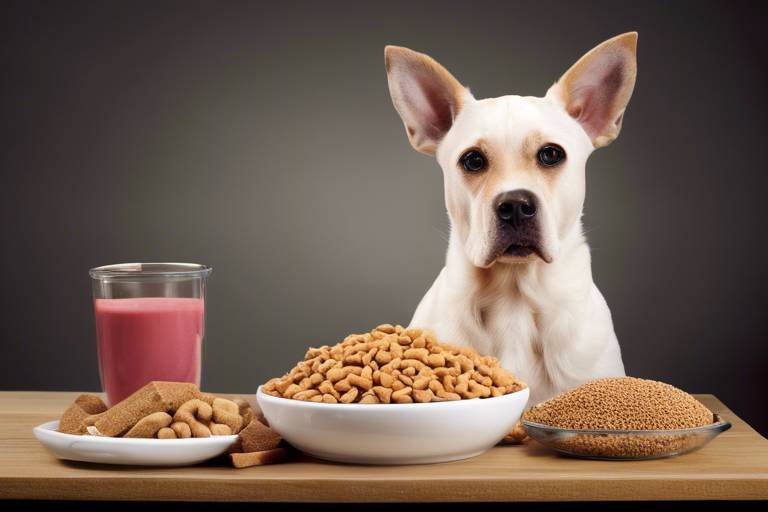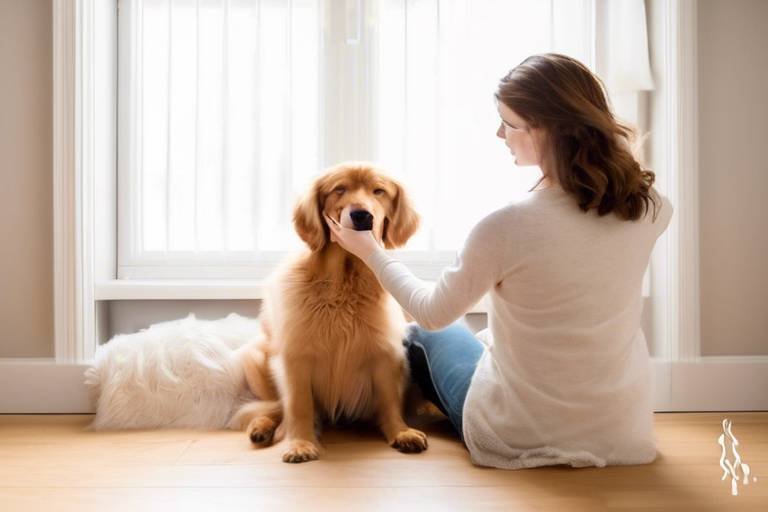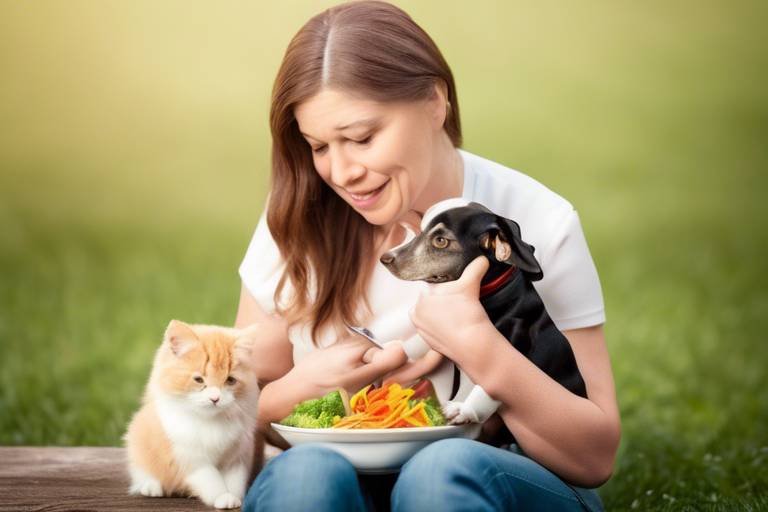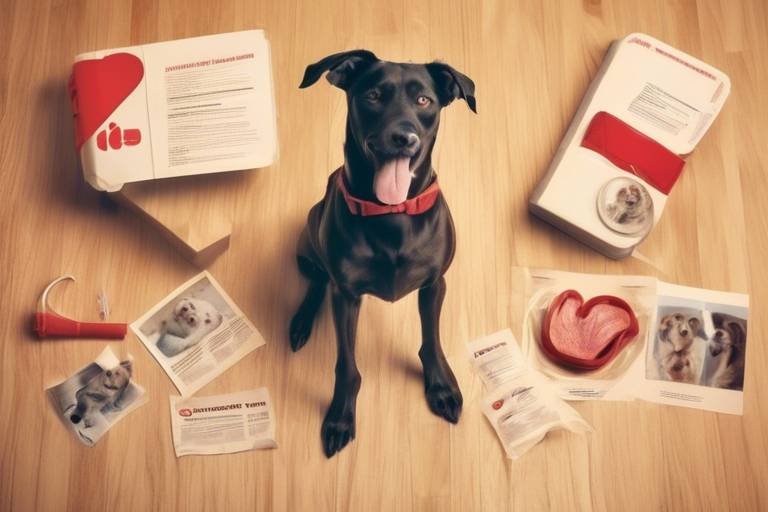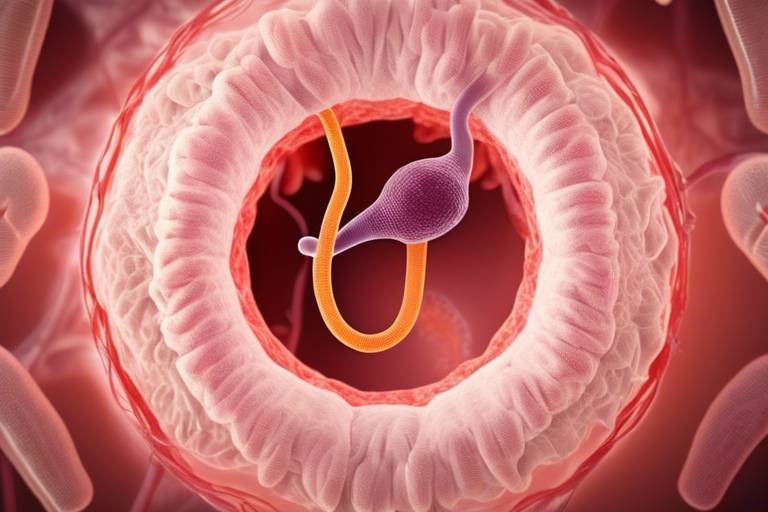How to Identify and Treat Gastrointestinal Issues in Pets
As pet owners, we often find ourselves in a unique relationship with our furry companions. They rely on us for love, care, and, most importantly, their health. One of the most common yet often overlooked aspects of pet health is gastrointestinal issues. Just like humans, pets can experience a range of digestive problems that can lead to discomfort and serious health concerns if left untreated. In this article, we will explore the common gastrointestinal problems that pets face, their symptoms, and effective treatment options. Understanding these issues can help you ensure your furry friends receive the proper care they need, so let’s dive in!
When it comes to gastrointestinal health in pets, there are a few prevalent issues that every pet owner should be aware of. These include diarrhea, vomiting, and constipation. Each of these conditions can manifest in various ways and can be indicative of underlying health problems. For instance, diarrhea may not just be a sign of dietary indiscretion; it could also indicate infections, parasites, or more severe conditions like inflammatory bowel disease. Conversely, vomiting can range from simple hairballs in cats to more serious conditions like pancreatitis or kidney disease. Recognizing these issues early can lead to timely treatment and improved health outcomes for your pet.
Identifying the symptoms of gastrointestinal issues is crucial for maintaining your pet’s health. Pet owners should keep an eye out for key signs that might indicate a problem. Changes in appetite, behavior, and stool consistency are all significant indicators. For example, if your usually ravenous dog suddenly turns up their nose at dinner, it could be a red flag. Similarly, if you notice any unusual behavior, such as excessive licking of the lips or pacing, it might be time to investigate further. Let's take a look at some specific symptoms that warrant attention.
Behavioral changes in pets can often indicate gastrointestinal distress. If your pet seems lethargic, restless, or is vocalizing more than usual, these could be signs of discomfort. Just like us, pets can feel unwell and express it in various ways. Think of it as your pet's way of saying, “Hey, something isn’t right!” If you notice these behavioral changes, it’s essential to monitor them closely and consider consulting your vet.
Altering eating habits can be a significant symptom of gastrointestinal issues. For instance, if your pet suddenly refuses to eat their favorite food or is begging for food constantly, it’s a clear signal that something might be off. Pets often communicate their discomfort through their eating habits, so pay attention to whether they are eating less or more than usual. A sudden change could indicate nausea or even pain associated with gastrointestinal distress.
Physical symptoms such as bloating or abdominal pain are critical indicators of gastrointestinal problems. If you notice your pet’s abdomen appearing swollen or if they seem to be in pain when you touch their belly, it’s essential to take these signs seriously. These physical symptoms can point to various issues, from simple gas to more serious conditions like gastrointestinal obstruction or torsion, which can be life-threatening.
Monitoring your pet's stool quality is essential for assessing gastrointestinal health. A pet's stool can tell you a lot about their digestive system. Normal stool should be firm and well-formed, while abnormal stool may be loose, watery, or contain blood. Keeping an eye on your pet's bathroom habits can help you catch potential issues early on. If you notice any drastic changes in your pet’s stool consistency, it’s time to take action and consult your veterinarian.
When gastrointestinal issues are suspected, a veterinary consultation is vital. Your vet will conduct a thorough examination to determine the underlying cause of your pet's symptoms. This process may include physical examinations, lab tests, and imaging studies. Think of your veterinarian as a detective, piecing together clues to uncover the mystery behind your pet's discomfort.
Various diagnostic tests can help identify gastrointestinal problems. Common tests include blood work, fecal exams, and imaging studies like X-rays or ultrasounds. These tests are crucial for diagnosing issues effectively and can help your veterinarian tailor a treatment plan specific to your pet's needs. Remember, early detection can make a significant difference in treatment outcomes.
Consulting a veterinarian is crucial for proper diagnosis and treatment. While it's tempting to rely on online resources or anecdotal advice from friends, nothing beats the expertise of a qualified professional. Your vet can provide tailored guidance and treatment options to ensure the best outcomes for your pet. Don't hesitate to reach out for help; after all, your pet's health is worth it!
- What should I do if my pet has diarrhea? - Monitor their behavior, ensure they stay hydrated, and consult your veterinarian if it persists.
- How can I prevent gastrointestinal issues in my pet? - Maintain a balanced diet, avoid sudden dietary changes, and ensure regular vet check-ups.
- When should I take my pet to the vet for gastrointestinal problems? - If symptoms persist for more than 24 hours or if you notice severe symptoms like blood in stool or vomiting.

Common Gastrointestinal Issues
This article explores common gastrointestinal problems in pets, their symptoms, and effective treatment options. Understanding these issues can help pet owners ensure their furry friends receive the proper care they need.
When it comes to our beloved pets, gastrointestinal (GI) issues can be a real pain in the gut—literally! Just like humans, pets can experience a variety of gastrointestinal problems that can make them uncomfortable and unhappy. Some of the most common GI issues include diarrhea, vomiting, and constipation. Recognizing these issues early can lead to timely treatment and improved health outcomes for your pet.
Let's dive deeper into these common gastrointestinal challenges:
- Diarrhea: This can be caused by anything from dietary indiscretion to infections. If your pet is experiencing loose or watery stools, it's important to monitor them closely, as dehydration can quickly become a concern.
- Vomiting: A single episode of vomiting might not be alarming, but frequent vomiting can indicate a serious issue. This could range from simple stomach upset to more severe conditions like pancreatitis.
- Constipation: If your furry friend is straining to go or hasn’t had a bowel movement in a couple of days, they may be constipated. This can lead to discomfort and even more serious complications if not addressed.
Each of these issues can arise for various reasons. For instance, dietary changes, stress, or even underlying health conditions can trigger gastrointestinal symptoms. It’s crucial for pet owners to be vigilant and observe their pet's behavior and bathroom habits. If you notice any of these symptoms persisting, it's time to consult a veterinarian.
In summary, being aware of these common gastrointestinal issues can empower you as a pet owner to take action when necessary. Early detection and treatment can make all the difference in your pet's health and happiness!
Identifying the symptoms of gastrointestinal issues is crucial. This section outlines key signs pet owners should monitor, such as changes in appetite, behavior, and stool consistency, to detect potential problems early.
Behavioral changes in pets can indicate gastrointestinal distress. This subsection highlights specific behaviors to look out for, including lethargy, restlessness, and unusual vocalizations that may signal discomfort.
Altering eating habits can be a significant symptom of gastrointestinal issues. This part discusses how to interpret changes in your pet's appetite, including refusal to eat or excessive hunger.
Physical symptoms such as bloating or abdominal pain are critical indicators of gastrointestinal problems. This section explains how to recognize these physical signs and their implications for your pet's health.
Monitoring your pet's stool quality is essential for assessing gastrointestinal health. This subsection provides guidance on what constitutes normal and abnormal stool, helping owners identify potential issues.
When gastrointestinal issues are suspected, a veterinary consultation is vital. This section outlines the diagnostic process, including physical examinations, lab tests, and imaging studies to determine the underlying cause.
Various diagnostic tests can help identify gastrointestinal problems. This subsection discusses common tests, such as blood work and ultrasound, that veterinarians use to diagnose issues effectively.
Consulting a veterinarian is crucial for proper diagnosis and treatment. This section emphasizes the importance of professional guidance in managing gastrointestinal issues to ensure the best outcomes for pets.
Q1: What should I do if my pet has diarrhea?
A1: Monitor your pet's condition closely. If diarrhea persists for more than 24 hours or is accompanied by vomiting, lethargy, or blood in the stool, consult your veterinarian immediately.
Q2: Can I give my pet over-the-counter medications for gastrointestinal issues?
A2: It's best to avoid giving your pet any medications without consulting your veterinarian first, as some human medications can be harmful to pets.
Q3: How can I prevent gastrointestinal issues in my pet?
A3: Ensure your pet has a balanced diet, avoid sudden dietary changes, and keep them away from potentially harmful substances. Regular vet check-ups are also essential for maintaining your pet's health.

Symptoms to Watch For
When it comes to our furry companions, being vigilant about their health is paramount. Identifying the symptoms of gastrointestinal issues is crucial for ensuring your pet receives timely care. Just like humans, pets can experience a range of digestive problems that can manifest in various ways. By keeping a close eye on their behavior, eating habits, and physical signs, you can catch potential issues before they escalate. So, what should you be looking for? Let's dive into the key symptoms that every pet owner should monitor.
One of the first indicators that something might be off with your pet is a change in their behavior. Pets are creatures of habit, and any deviation from their usual demeanor can signal distress. For instance, if your normally playful pup suddenly becomes lethargic or withdrawn, it might be time to investigate further. Additionally, restlessness or pacing can indicate discomfort, while unusual vocalizations, such as whining or growling, may also point to gastrointestinal distress. It's essential to pay attention to these subtle cues, as they can be your pet's way of communicating that something isn't right.
Another significant symptom to watch for is any alteration in your pet's eating habits. Have they suddenly become picky eaters, refusing their favorite kibble? Or perhaps they are wolfing down their food as if they haven’t eaten in days? Both scenarios can be red flags. A sudden refusal to eat might indicate nausea or discomfort, while excessive hunger could suggest that food is not being properly digested. Monitoring these changes can provide vital clues about your pet's gastrointestinal health.
Physical signs such as bloating or abdominal pain are critical indicators of gastrointestinal problems. If your pet's belly appears swollen or if they seem to be in pain when you touch their abdomen, it could indicate a serious issue. Other physical symptoms include vomiting, which may occur sporadically or persistently. If you notice any of these signs, it’s essential to consult with your veterinarian promptly. Remember, your pet's comfort is paramount, and timely intervention can make all the difference.
One of the most straightforward ways to assess your pet's gastrointestinal health is by monitoring their stool quality. A pet's stool can tell you a lot about their digestive system. Normal stool should be firm and well-formed, while abnormal stool can present in various forms, such as diarrhea, which can be watery and frequent, or constipation, where the stool is hard and dry. Look for changes in color, consistency, and frequency. If you notice anything unusual, it’s time to take action. Keeping a log of your pet's stool quality can help you communicate effectively with your vet during consultations.
In summary, being aware of these symptoms can empower you as a pet owner. Regularly observing your pet's behavior, eating habits, and physical signs can lead to early detection of gastrointestinal issues, ensuring your furry friend receives the care they need. Don’t hesitate to reach out to your veterinarian if you notice any concerning changes; after all, your pet's health is worth it!
Q: How often should I monitor my pet's stool?
A: It's a good idea to check your pet's stool quality daily. Any significant changes should be noted and discussed with your veterinarian.
Q: What should I do if my pet is vomiting?
A: If your pet vomits more than once or shows other symptoms like lethargy or diarrhea, contact your veterinarian immediately.
Q: Are there any dietary changes I can make to help with gastrointestinal issues?
A: Yes! A bland diet, such as boiled chicken and rice, can help soothe an upset stomach. However, consult your vet for personalized dietary recommendations.
Behavioral Changes
When it comes to our furry companions, their behavior often speaks volumes about their health. If you notice any in your pet, it could be a red flag indicating gastrointestinal distress. Just like humans, pets can experience discomfort that manifests in various ways. For instance, if your usually playful pup suddenly becomes lethargic, it might be time to dig a little deeper. Lethargy can be a sign that something isn’t quite right in their digestive system, and ignoring it could lead to more serious issues down the road.
On the other hand, restlessness can also be a symptom of gastrointestinal problems. If your pet is pacing around the house or seems unable to find a comfortable spot to settle down, this could indicate that they are experiencing discomfort in their belly. Think of it like a child who can't sit still when they have a tummy ache; our pets exhibit similar behaviors when they are not feeling well. Additionally, unusual vocalizations, such as whining or growling, can signal that your pet is in pain or discomfort, which might be linked to gastrointestinal issues.
It's essential to observe your pet's behavior closely, as these changes can provide valuable clues to their health status. If you notice a combination of the following behavioral changes, it may warrant a trip to the vet:
- Lethargy: Reduced energy levels and increased sleeping.
- Restlessness: Inability to settle down or find comfort.
- Unusual vocalizations: Whining, growling, or other sounds that indicate distress.
Understanding these signs can help you act swiftly. Remember, your pet relies on you to notice when something is off. By being proactive and attentive, you can ensure that they receive the care they need in a timely manner. If behavioral changes persist, don’t hesitate to consult your veterinarian for a thorough assessment and appropriate treatment options.
Q: What should I do if my pet shows signs of gastrointestinal distress?
A: If you notice any symptoms such as vomiting, diarrhea, or significant behavioral changes, it's essential to consult your veterinarian as soon as possible. Early intervention can prevent more serious health issues.
Q: How can I monitor my pet's gastrointestinal health at home?
A: Keep an eye on your pet's eating habits, stool quality, and overall behavior. Any significant changes should be noted and discussed with your vet during check-ups.
Q: Are there specific breeds more prone to gastrointestinal issues?
A: While any pet can experience gastrointestinal problems, certain breeds may be more susceptible due to their genetic makeup. Always consult with your veterinarian regarding your specific breed's health risks.
Changes in Eating Habits
When it comes to our beloved pets, their eating habits can speak volumes about their health. A sudden shift in how much or what they eat can be a red flag indicating gastrointestinal issues. For instance, if your furry friend suddenly refuses their favorite kibble or shows a disinterest in meals they once devoured with gusto, it’s time to take notice. This change can be likened to a canary in a coal mine—an early warning sign that something isn't quite right below the surface.
On the flip side, if your pet is exhibiting excessive hunger, it could be another signal of gastrointestinal distress. Imagine feeling like you haven't eaten in days, yet your stomach still feels empty; that’s how your pet might feel if they are struggling with digestion. Conditions like gastrointestinal obstruction or intestinal parasites can lead to increased hunger as their bodies attempt to compensate for the lack of nutrients. It’s essential to observe these changes closely and consider the context in which they occur.
Here are a few scenarios you should keep an eye on:
- Refusal to Eat: If your pet turns their nose up at food, it could indicate nausea or pain.
- Increased Appetite: An insatiable hunger might suggest malabsorption issues or other gastrointestinal problems.
- Change in Food Preferences: A sudden preference for softer foods or a complete aversion to dry food can be a sign of oral discomfort or digestive issues.
Furthermore, it’s crucial to consider the timing of these changes. Did they coincide with a new diet, a stressful event, or a recent vaccination? Sometimes, the cause can be as simple as a dietary switch that doesn’t sit well with their stomachs. However, if these alterations persist, it would be wise to consult a veterinarian. They can help determine if the changes in eating habits are merely a phase or a symptom of a more serious underlying condition.
To summarize, monitoring your pet's eating habits is a vital part of ensuring their overall health. Changes in appetite can be subtle and may not always be accompanied by other symptoms, making it essential to pay close attention to their behavior. Just like a detective piecing together clues, you can help your pet by being observant and proactive about their dietary changes.
Q: What should I do if my pet suddenly stops eating?
A: If your pet refuses to eat for more than 24 hours, it's important to consult your veterinarian. They can help determine if there's an underlying issue that needs addressing.
Q: How can I tell if my pet is overeating?
A: Signs of overeating can include excessive begging, weight gain, and vomiting. If you notice these signs, consult your vet for advice on managing their diet.
Q: Can stress affect my pet's eating habits?
A: Absolutely! Stress from changes in the environment, such as moving to a new home or the introduction of a new pet, can lead to changes in appetite. It’s essential to create a calm environment for your pet.
Q: Is it normal for pets to have occasional changes in appetite?
A: Yes, pets can have fluctuations in appetite due to various factors, including seasonal changes, activity levels, and minor illness. However, persistent changes should be evaluated by a veterinarian.Physical Symptoms
When it comes to our beloved pets, understanding their physical symptoms is crucial for identifying gastrointestinal issues. Just like humans, pets can experience discomfort that manifests in various ways, and recognizing these signs can be a game changer. For instance, bloating is often one of the first physical symptoms pet owners may notice. If your dog or cat has a distended belly that feels tight or hard to the touch, it could indicate a serious problem. Think of it like a balloon that’s been overfilled; it's not just uncomfortable, it can also lead to severe health complications if not addressed promptly.
Another key symptom to watch for is abdominal pain. Pets may exhibit this discomfort through behaviors such as whining, hiding, or even excessive grooming of their abdomen. If you notice your furry friend acting unusually, it’s essential to investigate further. Sometimes, pets might adopt a hunched posture or refuse to lie down comfortably, which can be a telltale sign that they’re experiencing pain in their stomach area. Just imagine how you would feel if you had a stomach ache; you’d likely want to curl up and avoid movement, and the same goes for our pets.
Additionally, keep an eye out for vomiting and diarrhea, which are direct indicators of gastrointestinal distress. While occasional vomiting or loose stools can happen, frequent occurrences should raise a red flag. If your pet is experiencing these symptoms, it’s important to monitor their frequency and severity. Are they throwing up multiple times a day? Is the diarrhea watery and persistent? These are critical questions to consider. Remember, pets can quickly become dehydrated, especially if they are losing fluids through vomiting or diarrhea.
To help you better understand these physical symptoms, here’s a quick reference table:
| Symptom | Possible Implications |
|---|---|
| Bloating | Potential obstruction or gas buildup; requires immediate attention. |
| Abdominal Pain | Indicates discomfort; could be related to various gastrointestinal issues. |
| Vomiting | May signal infection, dietary indiscretion, or other health problems. |
| Diarrhea | Possible infection, dietary change, or gastrointestinal upset. |
Understanding these physical symptoms is the first step in ensuring your pet gets the care they need. If you observe any of these signs, don’t hesitate to consult with your veterinarian. They can provide a thorough examination and recommend the best course of action to help your furry friend feel better.
- What should I do if my pet is showing signs of gastrointestinal distress?
If your pet shows any signs of gastrointestinal issues, such as vomiting or diarrhea, it's crucial to consult your veterinarian as soon as possible. - How can I prevent gastrointestinal problems in my pet?
Maintaining a balanced diet, providing fresh water, and regular vet check-ups can help prevent gastrointestinal issues. - Are certain breeds more prone to gastrointestinal problems?
Yes, some breeds are more susceptible to specific gastrointestinal conditions. It's essential to be aware of your pet's breed and its health predispositions.
Monitoring Stool Quality
Monitoring your pet's stool quality is not just a mundane task; it’s a vital aspect of keeping an eye on their overall health. Think of it as a window into their gastrointestinal world. Just like how we might notice when our own bodies feel “off” based on our bathroom habits, our pets communicate their health status through their stool. So, what should you be looking for? Let’s break it down.
The first thing to consider is the color of the stool. A healthy stool is usually a shade of brown, but variations can occur based on diet. For instance, a diet high in beets might lead to reddish stool, which isn’t necessarily alarming. However, if you notice black, tarry stools, it could indicate bleeding in the gastrointestinal tract, and that’s a serious situation that warrants immediate veterinary attention.
Next, you should observe the consistency. Healthy stool should be firm yet pliable, resembling a log-like shape. If your pet’s stool is too hard, it may indicate constipation, while loose or watery stools can signal diarrhea. Diarrhea can lead to dehydration, so it’s essential to act quickly. In fact, if diarrhea persists for more than a day, a vet visit is a must!
Another critical aspect to monitor is the frequency of your pet’s bowel movements. Typically, dogs may relieve themselves one to three times a day, while cats usually go once or twice. If you notice significant changes in frequency, such as an increase or decrease, it could be a sign of gastrointestinal distress. For example, if your pet suddenly starts going outside their normal routine, it might be time to investigate further.
Finally, don't overlook any unusual characteristics in the stool. This includes the presence of mucus, blood, or undigested food. If you spot these, it could indicate an underlying issue that needs to be addressed. Remember, your pet can’t tell you when something’s wrong, so being observant can make all the difference.
To summarize, here’s a quick reference table to help you assess your pet’s stool:
| Stool Quality | What to Look For | Possible Implications |
|---|---|---|
| Normal | Firm, brown, log-shaped | Healthy gastrointestinal function |
| Hard | Dry, crumbly | Potential constipation |
| Loose | Soft, mushy | Possible diarrhea |
| Watery | Liquid consistency | Diarrhea, risk of dehydration |
| Abnormal Color | Red, black, or green | Possible bleeding or dietary issues |
| Presence of Mucus/Blood | Visible mucus or blood | Serious gastrointestinal issues |
In conclusion, regularly monitoring your pet’s stool can provide invaluable insights into their gastrointestinal health. It’s like being a detective in your pet’s health journey, piecing together clues that can lead to timely interventions and happier, healthier lives. So, the next time you take your furry friend out for a bathroom break, remember: you’re not just cleaning up; you’re making sure they’re feeling their best!
- How often should I check my pet's stool? - It's a good idea to monitor your pet's stool quality daily, especially if they have a history of gastrointestinal issues.
- What should I do if I notice abnormal stool? - If you see anything unusual, such as blood or persistent diarrhea, consult your veterinarian as soon as possible.
- Can diet affect stool quality? - Absolutely! Changes in diet can lead to changes in stool consistency, color, and frequency.
- Is it normal for my pet to have an occasional loose stool? - While occasional loose stools can happen, frequent occurrences should be investigated further.

Diagnosis and Veterinary Consultation
When you suspect that your furry friend is suffering from gastrointestinal issues, the first step is to schedule a veterinary consultation. This is crucial because self-diagnosing can lead to misunderstandings and potentially worsen your pet's condition. During the consultation, the veterinarian will conduct a thorough physical examination to assess your pet's overall health and identify any visible signs of distress. This initial assessment often includes checking for symptoms such as bloating, tenderness in the abdomen, and unusual behavior.
Following the physical exam, the vet may recommend a series of diagnostic tests to pinpoint the underlying issue. These tests can vary depending on the symptoms presented but typically include:
- Blood Work: This helps to identify infections, organ function, and other health indicators.
- Fecal Analysis: A stool sample can reveal parasites or bacterial infections.
- Ultrasound or X-rays: Imaging studies provide a visual of the gastrointestinal tract, helping to detect blockages or abnormalities.
Understanding the diagnostic process is essential for pet owners. Each test serves a unique purpose in unraveling the mystery behind your pet's discomfort. For instance, while blood work can indicate systemic infections, a fecal analysis could reveal the presence of worms, which are common in pets but often overlooked. The results from these tests will guide the veterinarian in formulating an appropriate treatment plan tailored to your pet's specific needs.
Moreover, the importance of a vet's expertise cannot be overstated. They are trained to recognize subtle signs that may escape the untrained eye. For example, did you know that a pet's hydration level can drastically affect their gastrointestinal health? A vet can assess this and recommend necessary interventions, such as fluid therapy, if dehydration is detected. In short, consulting a veterinarian not only ensures that any serious conditions are addressed promptly but also provides peace of mind for pet owners.
In conclusion, when it comes to diagnosing gastrointestinal issues in pets, a timely veterinary consultation is your best ally. The combination of a thorough examination and targeted diagnostic tests will lead to the most effective treatment plan, ensuring your beloved companion can return to their happy, playful self as quickly as possible. Don't hesitate to reach out to a veterinary professional if you notice any troubling signs in your pet; your proactive approach can make all the difference!
Q: How do I know if my pet needs to see a vet for gastrointestinal issues?
A: If your pet shows symptoms such as persistent vomiting, diarrhea, or a change in appetite lasting more than 24 hours, it's time to consult your veterinarian.
Q: What can I do at home while waiting for my vet appointment?
A: Monitor your pet's symptoms closely, ensure they have access to fresh water, and avoid giving them any food until you've consulted with your vet.
Q: Are there any common treatments for gastrointestinal issues in pets?
A: Treatments can vary widely but may include dietary changes, medications to soothe the digestive tract, or in some cases, surgery if a blockage is present.
Q: How can I prevent gastrointestinal issues in my pet?
A: Regular vet check-ups, a balanced diet, and proper hygiene can help prevent many gastrointestinal problems. Additionally, keeping your pet away from potentially harmful foods and substances is crucial.
Diagnostic Tests
When your beloved pet exhibits signs of gastrointestinal distress, it’s essential to seek veterinary assistance promptly. The diagnostic process is a vital step in identifying the underlying issues affecting your furry friend. Veterinarians employ a variety of to pinpoint the cause of gastrointestinal problems effectively. These tests can range from simple physical examinations to more complex laboratory analyses and imaging studies.
One of the first steps a veterinarian might take is a thorough physical examination. This involves checking your pet's abdomen for signs of pain or discomfort, as well as assessing their overall health. The vet will likely ask about your pet's history, including any recent changes in diet, behavior, or environment. This information is critical in guiding the diagnostic process.
After the initial examination, your veterinarian may recommend several diagnostic tests, which can include:
- Blood Work: A complete blood count (CBC) and biochemical profile can reveal a lot about your pet's health. These tests help assess organ function, detect infections, and identify any underlying conditions that may be contributing to gastrointestinal issues.
- Fecal Analysis: Examining your pet's stool can provide insights into potential parasites or infections. A fecal test can help identify the presence of worms, bacteria, or other pathogens that could be causing gastrointestinal disturbances.
- Ultrasound: This non-invasive imaging technique allows veterinarians to visualize the internal organs of your pet. An ultrasound can help identify abnormalities such as tumors, blockages, or inflammation in the gastrointestinal tract.
- X-Rays: Radiographs can also be useful in diagnosing gastrointestinal issues. They can help detect foreign objects, obstructions, or other structural problems within your pet's digestive system.
Each of these tests provides valuable information that can lead to a more accurate diagnosis. For instance, blood work can reveal dehydration or electrolyte imbalances that may result from prolonged vomiting or diarrhea. Meanwhile, imaging studies like ultrasound can help visualize the gastrointestinal tract’s structure, allowing for the detection of any physical abnormalities.
It's important to remember that the choice of diagnostic tests will depend on your pet's specific symptoms and the veterinarian's assessment. Your vet may recommend additional tests based on the initial findings, ensuring a comprehensive approach to diagnosing gastrointestinal issues.
Ultimately, the importance of a veterinarian's expertise cannot be overstated. They are trained to interpret the results of these tests accurately and to understand how they relate to your pet's overall health. By working closely with your veterinarian and following their recommendations, you can ensure that your pet receives the best possible care and treatment.
- What should I do if my pet has diarrhea? - Monitor their condition closely and consult your veterinarian if it persists for more than a day or is accompanied by other symptoms like vomiting or lethargy.
- How often should I take my pet to the vet for check-ups? - Regular check-ups are essential, typically every six to twelve months, depending on your pet's age and health status.
- Can dietary changes help with gastrointestinal issues? - Yes, sometimes a change in diet can alleviate gastrointestinal problems, but it’s best to consult your vet before making any changes.
Importance of a Vet’s Expertise
When it comes to our beloved pets, their health is our top priority, and that’s where the expertise of a veterinarian becomes absolutely essential. Veterinarians are trained professionals who possess the knowledge and skills necessary to diagnose and treat a wide range of health issues, including gastrointestinal problems. While pet owners can spot some symptoms, understanding the underlying causes often requires a deeper insight that only a vet can provide.
Imagine trying to solve a complex puzzle without all the pieces. That’s what it’s like for pet owners attempting to diagnose gastrointestinal issues without professional help. A vet can piece together the symptoms, conduct thorough examinations, and run necessary tests to get to the bottom of your pet's discomfort. This is crucial because gastrointestinal problems can stem from various sources, such as dietary indiscretion, infections, or even serious conditions like tumors or organ dysfunction.
Moreover, the importance of a vet's expertise extends beyond just diagnosis. They can formulate a tailored treatment plan based on the specific needs of your pet. This plan may include dietary changes, medications, or even surgical options if necessary. Making the right choice without expert guidance can lead to complications that might worsen your pet's condition. For instance, what seems like a simple case of diarrhea could be a sign of a more serious underlying issue, such as pancreatitis or inflammatory bowel disease.
Another critical aspect of veterinary care is the ability to monitor your pet's progress. After initiating treatment, regular follow-ups with your vet are essential to ensure that your pet is responding well.
- Adjustments to Treatment: If the initial treatment isn't effective, a vet can modify the approach based on your pet's response.
- Preventive Care: Vets can provide guidance on preventive measures to avoid future gastrointestinal issues, such as diet recommendations and lifestyle changes.
In conclusion, while it may be tempting to self-diagnose or rely on online resources, nothing replaces the value of a vet's expertise. They are your best ally in ensuring that your pet receives the highest standard of care. Trusting a veterinarian not only helps in addressing immediate health concerns but also plays a vital role in your pet's long-term well-being.
- What should I do if my pet shows symptoms of gastrointestinal distress? It's essential to consult your veterinarian as soon as possible for a proper diagnosis and treatment.
- Can I treat my pet's gastrointestinal issues at home? While some mild issues can be managed at home, professional guidance is crucial for serious conditions.
- How often should I take my pet for check-ups? Regular veterinary visits are recommended at least once a year, but more frequent visits may be necessary for pets with ongoing health issues.
Frequently Asked Questions
- What are the common gastrointestinal issues in pets?
Common gastrointestinal issues in pets include diarrhea, vomiting, and constipation. These problems can arise from various factors, such as dietary changes, infections, or underlying health conditions. Recognizing these issues early is crucial for effective treatment.
- How can I tell if my pet is experiencing gastrointestinal distress?
Look for signs such as changes in appetite, behavior, and stool consistency. Symptoms like lethargy, restlessness, or unusual vocalizations may indicate discomfort. Additionally, physical signs like bloating or abdominal pain are critical indicators of gastrointestinal problems.
- What should I monitor regarding my pet's stool?
Monitoring your pet's stool quality is essential. Normal stool should be firm and well-formed, while abnormal stool may be loose, watery, or contain blood. Any significant changes in stool consistency can signal potential gastrointestinal issues that require attention.
- When should I consult a veterinarian for gastrointestinal issues?
If you notice persistent symptoms like vomiting, diarrhea, or changes in appetite lasting more than 24 hours, it's time to consult a veterinarian. Early intervention can prevent complications and lead to better health outcomes for your pet.
- What diagnostic tests do veterinarians use for gastrointestinal problems?
Veterinarians may utilize various diagnostic tests, including blood work, fecal examinations, and imaging studies like X-rays or ultrasounds. These tests help identify the underlying cause of gastrointestinal issues and guide appropriate treatment.
- Why is it important to seek a veterinarian's expertise?
Consulting a veterinarian is crucial for accurate diagnosis and effective treatment. They have the knowledge and tools necessary to identify gastrointestinal issues and recommend the best course of action, ensuring your pet receives proper care.


